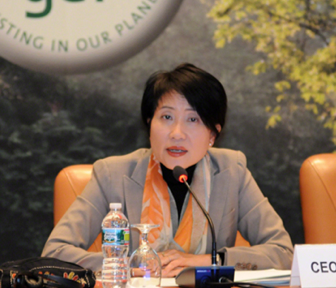The 43rd Meeting of the Global Environment Facility (GEF) Council adopted a decision indicating its willingness, if invited by the Intergovernmental Negotiating Committee (INC) for the globally legally binding agreement on mercury, to consider GEF becoming "a" or "the" financial mechanism for the agreement, within the GEF framework.
 15 November 2012: The 43rd Meeting of the Global Environment Facility (GEF) Council debated whether the GEF can serve as a financial mechanism for the upcoming global agreement on mercury, and adopted a decision indicating the Council’s willingness to consider an invitation to do so. It also adopted a Work Program that amounts to US$174 million and aims to benefit 63 countries, and includes projects relevant persistent organic pollutants (POPs).
15 November 2012: The 43rd Meeting of the Global Environment Facility (GEF) Council debated whether the GEF can serve as a financial mechanism for the upcoming global agreement on mercury, and adopted a decision indicating the Council’s willingness to consider an invitation to do so. It also adopted a Work Program that amounts to US$174 million and aims to benefit 63 countries, and includes projects relevant persistent organic pollutants (POPs).
The Council convened in Washington, DC, US, from 13-15 November 2012, at International Monetary Fund (IMF) headquarters.
The Council discussion on the mercury mechanism was preceded by an address from Jim Willis, Executive Secretary for the Basel, Stockholm and Rotterdam Conventions. Willis reminded Council members how important it had been for the Stockholm Convention negotiations to receive a clear signal from the GEF Council on the GEF’s willingness to be the financial mechanism for that instrument and to provide funding for enabling initiatives.
The Council opened its discussion by examining a GEF Secretariat paper exploring how the GEF might serve the functions of a financial mechanism for the mercury agreement, if invited to do so by the Intergovernmental Negotiating Committee (INC). The paper, requested by the Council at its 42nd session in June 2012, covered such aspects as the format for channeling resources, replenishment, compliance with agreement obligations, governance, and possible ways to handle enabling activities, capacity building and technology transfer.
Most Council members expressing an opinion said the Secretariat paper had demonstrated that the GEF could serve as the financial mechanism, or one of multiple mechanisms, if asked to do so, and they agreed on the need to signal to the INC that the GEF was open to an invitation. One member voiced concern that a Council decision on this issue might “prejudge” the INC 5 outcome in January 2013 and preclude serious consideration by the INC of other financial mechanisms, such as one modeled after the Montreal Protocol’s Multilateral Fund.
The Council agreed to a decision indicating that if the INC invites it to be “the” or “a” financial mechanism for the mercury agreement, the Council was willing to examine the invitation, but within the context of the GEF framework.
The Council also approved the Work Program, including the following projects on POPs: Pesticide Risk Reduction in Malawi, to be implemented by the Food and Agriculture Organization of the UN (FAO); Environmentally Sound Management and Final Disposal of Polychlorinated Biphenyls (PCBs) in Ukraine, to be implemented by the UN Industrial Development Organization (UNIDO); and two regional projects providing support for the POPs Global Monitoring Plan under the Stockholm Convention, to be implemented by the UN Environment Programme (UNEP), one for the Latin America and Caribbean (LAC) region benefiting Antigua and Barbuda, Argentina, Barbados, Brazil, Chile, Colombia, Ecuador, Jamaica, Mexico, Peru and Uruguay, and the other for the Africa Region benefitting Democratic Republic of the Congo, Egypt, Ethiopia, Ghana, Kenya, Mali, Mauritius, Morocco, Senegal, Tanzania, Togo, Tunisia, Uganda and Zambia. [IISD RS Meeting Coverage]